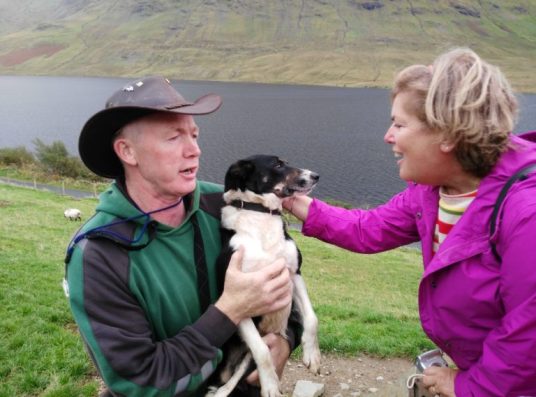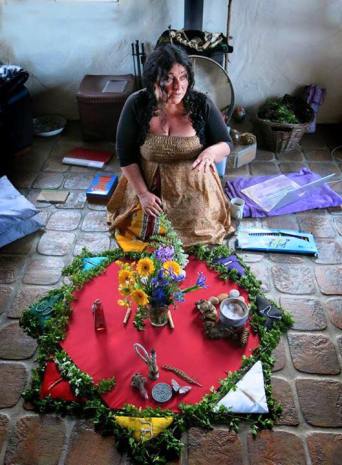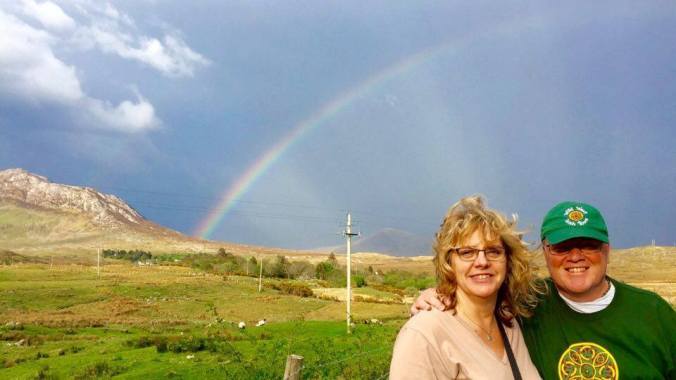Good morning, good afternoon, good evening!
It occurs to me that some of you may not know exactly who or what a Wild West Irish Tour is. I’d be happy to break that down for you now!
Wild West Irish Tours is the beloved creation of Trish O’Donnell-Jenkins and Michael Waugh, founded [appropriately] on Saint Patrick’s Day in 2011. It explores fundamental traditional Irish practices, historical places, and the seldom-seen beauties of the Wild West of Ireland. Assisted by such wonderful people as Joe McGowan [an author and storyteller engrossed in the preservation of Irish traditions], Dr. Michael Roberts [whom you might remember from a previous post], and many terrific others, the Wild West Irish Tours took off with a triumphant symphony of fiddles and flutes. You can read more about it here, however…

Westie Margaret Ann & a few local friends!
You might’ve been expecting something along the lines of an Irish John Wayne, given the tour title – but we trade cowboys for sheepherders [and we like it that way]. Let’s break down the top five fundamentals of what makes a Wild West Irish Tour a Wild West Irish Tour, shall we?
1. Authenticity
One of our top priorities is making sure you don’t experience a “tourist-y”’ tour. In the Land of Heart’s Desire; we try to stay true to our hearts: by connecting with locals and seeking out unique experiences. We speak with people who are immersed in Celtic folklore; those who know the area well and can tell us a thing or two new every time. There’s no big buses or long lines. We promise nothing but a good time: one that comes from a world that is both sincere and exciting; riddled with stories and, yes, occasional song. From the dust of the road on our boots to your first breaking of brown bread at a pub table, the genuine hospitality of Ireland is everywhere on our tours.

Simone; local shaman and guide to Celtic pagan traditions. Photo by Wild Westie Ron Byers.
2. Spontaneity [& Flexibility!]
It’s important to keep an open mind and a keen eye when on one of our Wild West Irish adventures – a sudden stop for sheep and a scenic view might be more likely than you think! There’s a vague structure [we do have some plans, after all] to keep our opportunities open. There might be a music festival in one of our townships that evening; or perhaps a special performance by a local dancer. You just never know, and that’s the beauty of being open to possibility. On another note: flexibility might just mean sunrise yoga [literal flexibility; anyone?] or weaving between the trees to discover a glittering waterfall…

Trish O’Donnell-Jenkins shows us how it’s done!
OR BOTH!
We also tend to keep groups small [6-8] to further enhance that flexi-spontaneity, if you will.
3. What’s Seldom is Wonderful
One of our more popular monikers is a Gaelic phrase, “an rud is annamh is iontach” or, “what’s seldom is wonderful” [alternatively: “the thing that’s seldom is wonderful”]. The easiest way to explain this one is marveling at a rainbow. You know it wasn’t there a moment ago, and in another moment, it could be gone. As a result, a rainbow is seldom-seen; a rarity: and therefore, wonderful to behold in its brevity. We see much of these seldom moments in Ireland – the tranquility and aforementioned spontaneity allow for the world to show us incredible things, even for a moment. These “Irish Moments” are what can make the trip that much more unique.

Michael Waugh & longtime friend [and Westie!] Brenda Kennedy-Hudler showing us all how to seize the moment.
4. Expect Great Things in Simple Places
Coupled with the previous sentiment, this one refers more to the simplicity of the rural Irish West; the countryside (and quaint towns) that tells tales of rolling agate hills and bountiful forests; twisting groves where fairies supposedly play and upturned stones left to keep watch over fields full of lively livestock patterned with ribbons or splashed with all the colors imaginable. Perhaps you’re visiting from a big city – you’ll find peace in this place where time moves differently, around excitable border collies or shockingly-patient donkeys. If you come from farm country, you’ll feel right at home among people who make little to no fuss about the urbane lifestyle. And if you’re somewhere in-between [re: suburbia], don’t you worry. The balance here is evident, and the point of it all is that you’ll find that even the simplest of things can hold the greatest wonders [there’s a story to be told here, but you’ll have to hear it on one of our fine sojourns].

Discovering a simple, yet special place with WWIT guide Pius Murray.
5. Imagination
Finally, we wouldn’t be writing to you from the literal Land of Heart’s Desire; the home of Yeats, Joyce, Wilde, and others without implying imagination and creativity. The world of Western Ireland thrums with music; pulses with poetry, sings with performance, but also provokes a reaction from any who visit. It gives back in ways you might not expect; prompting response to its calm emerald enclosures and rocky mountain hills. The folklore told by our guides might inspire you to see Sidhe peeking between the leaves of the trees, or prompt song at a tavern when asked [even if you might be a little spotlight-shy]. With the flexibility that allows for imaginative thought, anything is possible: we encourage each and every one of you to use your imagination in thinking about the Wild West of Ireland. It means something different to all who visit –
I wonder what it might mean to you?

Create your own story in seeing all there is to see…
I hope this has cleared a few things up – at least enough to see the rainbow from the rain!
Until next time, be well!
Sam Fishkind.